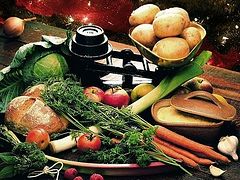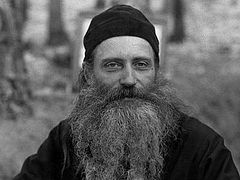As we embark on another of the Church’s fasting periods, it is interesting to read this treatise by the holy Patriarch Tikhon of Moscow, written at the turn of the twentieth century, when movements such a vegetarianism were just getting under way. His analysis is still helpful and relevant today, because attitudes towards fasting and vegetarianism have essentially remained unchanged.
***
Christian fasting has been often and in many ways subject to attacks and criticism from “fleshly” people. These attacks become all the more vicious in times when people walk according to the flesh and take care to please it. In such times of the reign of the flesh and waning of the spirit, voices in defense of fasting are rare and timid. All the more pleasant to hear a voice advocating fasting, coming in our days from the secular world, which by no means often sings in unison with the spiritual world of the Church. We are talking about the vegetarian movement, about which we could only be glad, if only the vegetarians themselves would not allow a number of faults and mistakes.
By vegetarianism is meant the movement in modern society that allows only plant-based foods, and no meat or fish1 (this is where the name vegetarianism comes from—the Latin vegetare—to grow). Vegetarians defend their teaching with the following reasons:
-
From anatomy: Man belongs to the category of herbivores, and not omnivores or carnivores;
-
From organic chemistry: Plant-based food contains all necessary nourishment and can support man’s strength and health to the same degree as mixed foods, that is, animal and vegetable;
-
From physiology: Plant-based foods are more easily absorbed than meats;
-
From medicine: Meats cause inflammation in the man’s organism and shorten his life span, while vegetarian food to the contrary saves it and prolongs it.
-
From economy: Plant-based foods are less expensive than meats;
-
Finally, there is the moral aspect: Killing animals is against man’s moral sensibility, while vegetarianism brings peace into the world and into man’s life, and into his relationship with the animals.2
Some of these reasons were expressed in deep antiquity, in the pagan world (by Pythagoras, Plato, Sakya Muni [Buddha]); in the Christian world they were more often repeated, but just the same, those who expressed them were specific people who did not make up the entire society. Only during the mid-nineteenth century in England, and later also in other countries did whole societies of vegetarians appear. Since then, vegetarian movements have only grown, you can encounter their followers more and more often, and they zealously spread their views and strive to carry them out. In Western Europe there are many vegetarian restaurants (there are as many as thirty in London alone), in which the food is prepared exclusively from plants. Cookbooks have been published on vegetarian cuisine in which eating regimes are outlined, with instructions on how to prepare over 800 dishes. In Russia we also have followers of vegetarianism, amongst whom is the famous author, Count Leo Tolstoy.
Vegetarianism has a potentially great future, 3 because, they say, mankind will come to it in the end whether it wants to or not. There is already a noticeable dearth of cattle in some European countries, and in Asia this they are almost completely gone, especially in the more densely populated countries like China and Japan. So, in the future, it would follow, there will be no more cattle, and thus no meat. If that is so, then vegetarianism provides the service through its followers of devising methods of preparing foods and a way of life that all people will sooner or later have to adopt. But besides this problematic service, to vegetarianism belongs the undoubted merit of addressing our pleasure-loving and pampered age with an insistent call to temperance.
“Take a look,” says Tolstoy, “at our life, at what motivates the majority of people in our world. Ask yourself, what is the main interest of the majority? And strange as it may seem to us who are used to hiding our true interests and presenting false and artificial ones, the main interest of the majority of people in our times is to please the taste, the pleasure of food. Beginning with the poor and on to the richest classes in society, gluttony is, I think, the main goal, the main pleasure of our life. The poor, working man is the exception only to the extent that poverty hinders him from indulging in this passion. As soon as he has enough time and means, he will emulate the upper classes and get himself the tastiest and sweetest foods… And look at the life of educated people, listen to their conversations. They are as if completely occupied with such lofty subjects: philosophy, science, art, and poetry, as well as the distribution of wealth, the people’s well-being, the education of youth. But for an enormous majority this is all a lie, all something they do in between things, in between the real business—breakfast and lunch, until the stomach is full and they can’t eat any more. The lively interest, the true interest of the majority is food. How to eat, what to eat, when, and where. Not a single festivity, not a single joy, not a single opening no matter what it is can happen without food. People pretend that dinner, that food is a matter of indifference to them; but this is a lie. Just try to replace their expected refined dishes with, I won’t say bread and water, but porridge and noodles, and you’ll see what a tempest it will arouse. And it becomes clear that in gathering together, these people’s main interest is not at all what they are trying to present, but in fact, it’s food.”4
Of course, this description of modern society is somewhat of an exaggeration, but there is a significant amount of truth in it. Therefore, the vegetarians’ insistent call to temperance, to limiting one’s desires is very apropos; and if they were to limit themselves to this call, then we could only rejoice in the successful growth of the vegetarian movement. But very often success makes the head spin and puffs a man up. The same thing has happened with followers of vegetarianism: They ascribe to it what it doesn’t and cannot have. Vegetarians think that if people would not eat meat, then total bliss would have taken hold of the world long ago. Even Plato, who gave us an example of how to reason intelligently about ideas and other similar lofty matters but at the same time, make far from reasonable decisions in the spheres of governmental and social life, in his dialogue, “On the Republic”, the root of injustice, the source of wars and other evils consisted in the fact that people do not want to be content with a simple way of life and rough vegetable foods, but eat meant instead.5 And in the writings of another advocate of vegetarianism, this time a Christian, the Anabaptist Thomas Tryon (†1703), we find words on this account that this author cites in this book The Ethics of Food with particular “pleasure”. “If people were to cease their strife,” says Tryon, “to cease from oppression and what enables and disposes them towards the same—from the killing of animals and using their blood and meat as food—then in a short time their mutual murdering, devilish discord and cruelty would weaken, and perhaps even disappear completely… Than all enmity would cease, no longer would there be heard the pitiful moans of people, or animals. Then there would not be the rivers of blood flowing from slaughtered animals, or the stench of meat markets, or the blood-spattered butchers, or the thunder of canons, or the burning of towns. The foul-smelling prisons would disappear, the iron gates behind which men languish far from their wives, children, and fresh air would shatter, and the shrieks of those begging food or clothing would be silenced. There would be no troubles, no cunning inventions for destroying in a day what thousands of people created with great labor, no terrible cursing, no rude speech. There would be neither the unnecessary torment of animals with labors beyond their strength, nor the corruption of maidens. There would not be the leasing of land and farms at such prices as force the lessee to exhaust himself, his servants, and his animals nearly to death and nevertheless remain in unpaid debt. There would not be the oppression by the higher of the lower; there would be no need because of the absence of luxury and gluttony. The moans of the wounded would cease; there would be no need for medics to remove bullets from bodies, to amputate mutilated or broken arms and legs. Silenced would be the screams and moans from podagra or other sicknesses (like leprosy or tuberculosis), other than the infirmities of old age. And children would cease to be the victims of innumerable sufferings and would be just as healthy as the lambs, the calves, or the babies of all other animals, who would know no sickness.”6
See what an alluring picture the vegetarians paint, and how easily all of this can be attained: We only have to stop eating meat and on earth there will be a real paradise, a life that is untroubled and without sorrows.
Nevertheless, we can allow for serious doubts concerning the feasibility of all the rainbow-colored dreams of vegetarians. Although they claim that “their system strikes at the very root of evil and promises benefits that are not utopian”,7 however just because people stop eating meat, the earth is not likely to become paradise, the Kingdom of God, For the kingdom of God, according to the apostle Paul’s wise words, is not meat and drink; but righteousness, and peace, and joy in the Holy Ghost (Rom. 14:17). Christian teaching has always been alien to the spirit of daydreaming. It differs from various utopian theories in that it clearly discerns the difference between the ideal and the reality, and while directing human yearnings toward the end goal in the ideal, it at the same time never loses sight of reality. And with this reality it is impossible to have the total fulfillment of ideal happiness. Want, woe, and fights will always poison man’s earthly life; they will always be our fellow travelers in the current state, because the reasons for these unfortunate manifestations are not external, not accidental and transitory, but deep and interior, consisting in the sinful state of human nature itself, which is corrupted by sin. As long as such a state continues in human nature, as long as the abnormal conditions of our life do not change at the very root, as long as our correct relationship is not restored with God, with our own calling, and with the outside world; that is, as long as the present life does not change into to the new, eternal life, as long as the new heaven and new earth in which truth lives is not revealed to mankind (cf. 2 Pet. 3:13)—until then, there will always be want, poverty, sorrows and sickness. And since the roots of all these problems lie much deeper than what the vegetarians and other dreamers like them imagine, then neither can the means they present cure evil by themselves—they are too small, superficial, and insignificant for that.
To be continued…





